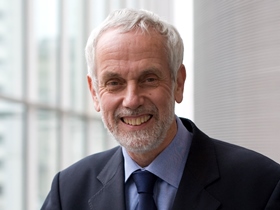Forecasting the future: Sir Brian Hoskins and the outlook for weather science
Release Date 16 June 2015

One of Britain's leading scientists is celebrating his 70th birthday with an international conference to explore the future of weather science.
Professor Sir Brian Hoskins FRS, one of Reading's most eminent scholars, joined the University's Department of Meteorology in 1971. He played a key role in building the Department into one of the world's leading centres for research and training in meteorology and climate science.
To celebrate the beginning of his eighth decade, the University is bringing together some of the world's leading meteorologists to Reading this week to discuss where the science needs to go to continue to advance in the decades ahead.
Sir Brian said: "Our ability to forecast the weather and to model climate has changed beyond all recognition over the past 40 years. The seven-day forecast is now as skilful as the two-day forecast was, and forecasts of El Niño and of the possible changes in climate caused by human activity are extremely important to society.
"Crucial to this progress has been the huge growth in computer power and the observations provided by satellites. The third and most important aspect has been the increased understanding of how the weather and climate systems work.
"For future progress, the same three ingredients will be required, more powerful computers, better observations and, above all, the ingenuity of humans leading to improved understanding of what's going on."
To mark Sir Brian's birthday, an international two-day conference is being held on the University of Reading's Whiteknights Campus, on 17-18 June. ‘Hoskins@70: Meteorology - what is the forecast?' will focus on where the subject is heading during the 21st century.
Among the topics under discussion at the event are:
- Forecasting extreme weather events in the future
- Improving weather forecasts with finer detail
- How understanding climate from the past can provide confidence in the future
- How theory can improve our understanding of the climate
- Are climate predictions just weather forecasts on a longer scale?
- Can we create a truly global future system for measuring the weather?
The event is the latest chapter in a long-running and successful career at the peak of meteorology for Sir Brian. In his career to date, he has pioneered new concepts and techniques that have changed the way we look at our atmosphere (see below).
PROFESSOR SIR BRIAN HOSKINS
Sir Brian's work has led to new understanding of the ingredients that determine the growth and decay of low pressure systems, including the major storms that can cause such disruption to society. On more global scales, Sir Brian has made key insights into the processes by which unusual weather conditions in one part of the world can lead to unusual, and sometimes severe, weather conditions elsewhere in the world.
In addition to his esteemed research, Sir Brian has chaired many major national and international committees and provided high-level input to the Met Office and the European Centre for Medium-range Weather Forecasts (ECMWF), which is also in Reading.
Sir Brian has been conscious of the importance of providing policymakers with top-quality scientific advice. He was a long-serving member of the Royal Commission on Environmental Pollution and serves on the Committee on Climate Change, an independent statutory body established under the Climate Change Act in 1998. It plays a key role in advising the UK Government on its response to climate change and monitors progress towards its stated targets.
Sir Brian has received many major honours that recognize the depth and breadth of his contributions to meteorology. He was elected a Fellow of the Royal Society, the UK's national science academy, in 1988 at the age of just 43, made a Commander of the British Empire (CBE) in 1998, and received a knighthood in 2007 for his services to meteorology. Sir Brian was made a foreign member of the US National Academy of Sciences and the Chinese Academy of Sciences in 2002. In 2014 he was awarded the highly-prized Buys-Ballot Medal by the Royal Netherlands Academy of Arts and Sciences - the award has only been made 12 times previously since 1893 to 'researchers who have inspired others by their outstanding contribution to the field of meteorology'.
As part of this latest conference, Sir Brian will present a lecture on his new insights into the ‘Hadley Cell', which determines the nature of the intense rainfall that characterises the tropics and the strength of the sub-tropical trade winds, and its consequences for weather and climate across the globe.
